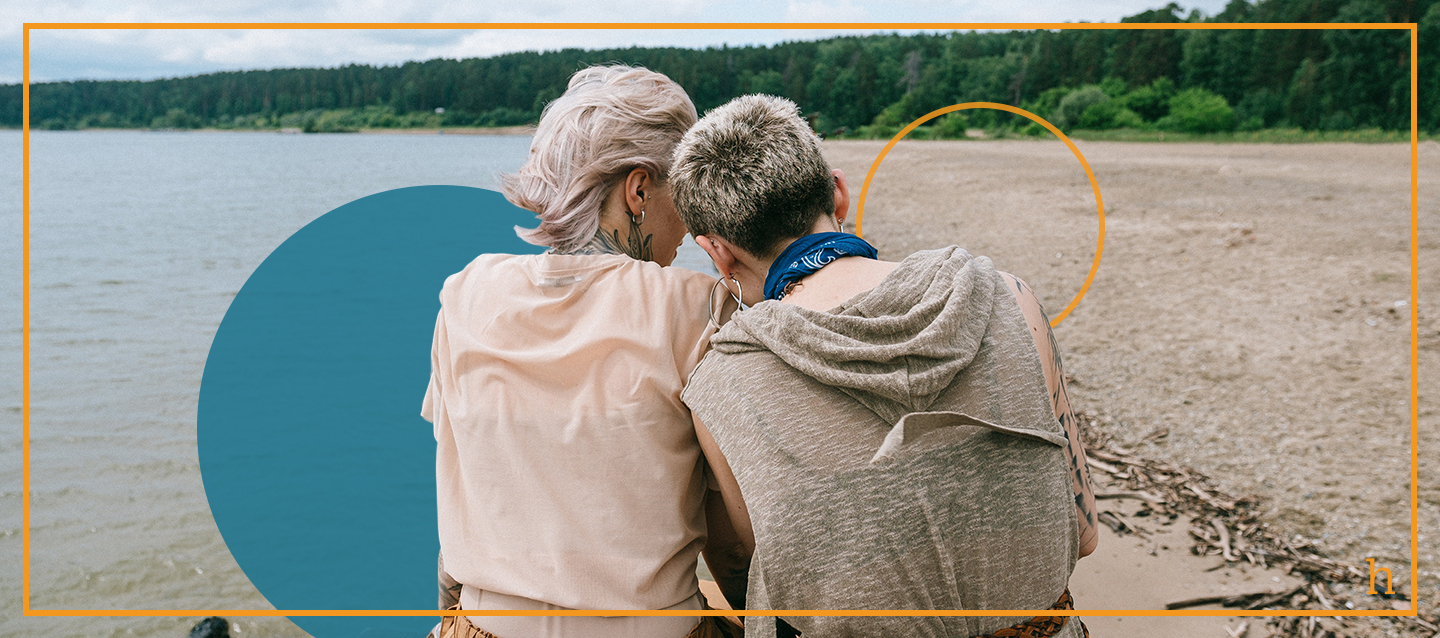As we all know, relationships are multifaceted and dynamic by nature; LGBTQ+ relationships are no exception. When I think about the process involved in developing a new LGBTQ+ relationship, many foundational steps come to mind—among them, navigating the cultural and societal barriers many in the LGBTQ+ community face. Barriers that, when successfully addressed and overcome, engender resilience, love, and mutual respect in many relationships.
As you might imagine, there is not a handbook on how to navigate these barriers, but a supportive community and a good therapist help. I want to illustrate some of the obstacles in LGBTQ+ relationships by sharing my experience with you, and as it is with all stories, the best place to start is the beginning.
With three months left of college, I met a girl. Our initial story is one that undoubtedly sounds familiar to a lot of LGBTQ+ folks. Awkward yet longing glances, communicating our interest in one another through friends of friends, timid disbelief that we were both on the same page— all of this helped along with a little bit of liquid courage. Young and newly in love, we had no idea what the future held; we were together, and that was what mattered.
We knew in our hearts that we had something special. During this time, we leaned heavily on our friends – our chosen support system - to help us through the ups and downs of our budding relationship. Through the love and support they provided, it became clear that our community was an integral part of building and sustaining a healthy, loving relationship.
Once we graduated college, we were thrust into the real world. Left unprotected from the harsh scrutiny of societal expectations grounded in heterosexism, we suddenly found ourselves on the fringe of society, feeling out of place, and at times, unsafe or unwanted.
This feeling was only amplified when we were with our families. We wanted so badly for our families to embrace our relationship and be curious about our story, but instead, we found only passive acceptance. For many, myself included, passive acceptance is a welcome reaction, compared to the alternatives like alienation or ostracization; however, the passive acceptance still left us feeling unwanted.
I would be lying to you if I said that through hard work and courage, we overcame it all. In reality, we both still carry the wounds with us, which absolutely informs how we interact in public settings, and with our families to this day. Through this struggle, we learned that when your relationship and your identity do not fit into the picture society has painted, you are forced to adapt, to draw upon your resilience, and to strive to love in a more understanding and empathetic way.
Resilience looks different, depending on each person and their individual history and circumstances. Sometimes, we need help to be resilient. Learning when to lean on each other and when to ask for help is critical. A therapist was able to hold space for us to explore our identities and help us in our journey in finding the right words to express our pain, our joy, and everything in between.
The right therapist not only helps you to help yourself, but they also act as an advocate and a voice against societally imposed oppressions that are often a cause for distress amongst many LGBTQ+ folks. Additionally, for us, help had many faces beyond our therapist: best friends, an older queer couple, an online support group, a supportive spiritual community, and a sibling all walked alongside us during this time.
Inevitably, as our relationship has matured, questions about the future have arisen. The hard conversations about marriage or lifelong partnership, children, and life goals have taken center stage. The impacts of heterosexism have resurfaced as we have tried and struggled to picture what a wedding will look like or how our family will develop. I cannot tell you how many times I have been asked, “But who will walk down the aisle?” or “Who will go by ‘mom’?” Micro-aggressive comments naturally take a toll, and it can be a lot easier to avoid or ignore them rather than confront and correct them.
This process is made more difficult due to the reality that it takes time to process your own feelings and reactions to comments like these and engage in your own unlearning of heterosexist narratives. However attractive, we can agree that avoidance is usually not the best solution. This is yet another reason why having an informed and proactive support system can help LGBTQ+ folks navigate structures built by a heterosexist society.
To address and unpack these narratives, a knowledgeable therapist can help empower LGBTQ+ folks by arming them with tools and knowledge to respond to discriminatory acts. A therapist can help you explore what safety looks like, examine the impacts of code-switching when a situation is unsafe, and how to process the lasting effects of it all. Trained and experienced therapists can simultaneously educate and support LGBTQ+ clients as they grapple with the impacts of heterosexism and discrimination in their lives and their relationships, ultimately helping them cultivate the lives and narratives that fit best.
Many friends and colleagues who identify with the LGBTQ+ community have shared similar stories about the love they have encountered throughout their lives. Despite the different cast of characters or plot changes – both subtle and surprising – the end message is the same: LGBTQ+ relationships, our relationships, are beautifully bold expressions of love and acts of revolution worth celebrating.

